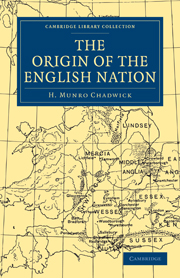Book contents
- Frontmatter
- PREFACE
- Contents
- CHAPTER I ENGLAND IN THE SIXTH CENTURY
- CHAPTER II THE WEST SAXON INVASION
- CHAPTER III THE INVASION OF KENT
- CHAPTER IV THE SAXONS, ANGLES AND JUTES IN BRITAIN
- CHAPTER V THE SAXONS, ANGLES AND JUTES ON THE CONTINENT
- CHAPTER VI THE KINGS OF ANGEL
- NOTE. THE EARLY KINGS OF THE DANES
- CHAPTER VII THE AGE OF NATIONAL MIGRATIONS
- CHAPTER VIII THE SAXONS AND ANGLES IN ROMAN TIMES
- CHAPTER IX THE CLASSIFICATION OF THE ANCIENT GERMANI
- CHAPTER X THE CULT OF NERTHUS
- CHAPTER XI KING AETHELWULF'S MYTHICAL ANCESTORS
- CHAPTER XII SOCIAL CONDITIONS OF THE ROMAN PERIOD
- ADDENDA
- INDEX
- Plate section
CHAPTER V - THE SAXONS, ANGLES AND JUTES ON THE CONTINENT
Published online by Cambridge University Press: 07 September 2010
- Frontmatter
- PREFACE
- Contents
- CHAPTER I ENGLAND IN THE SIXTH CENTURY
- CHAPTER II THE WEST SAXON INVASION
- CHAPTER III THE INVASION OF KENT
- CHAPTER IV THE SAXONS, ANGLES AND JUTES IN BRITAIN
- CHAPTER V THE SAXONS, ANGLES AND JUTES ON THE CONTINENT
- CHAPTER VI THE KINGS OF ANGEL
- NOTE. THE EARLY KINGS OF THE DANES
- CHAPTER VII THE AGE OF NATIONAL MIGRATIONS
- CHAPTER VIII THE SAXONS AND ANGLES IN ROMAN TIMES
- CHAPTER IX THE CLASSIFICATION OF THE ANCIENT GERMANI
- CHAPTER X THE CULT OF NERTHUS
- CHAPTER XI KING AETHELWULF'S MYTHICAL ANCESTORS
- CHAPTER XII SOCIAL CONDITIONS OF THE ROMAN PERIOD
- ADDENDA
- INDEX
- Plate section
Summary
In the last chapter we saw that according to Bede the invaders of Britain came from three of the bravest nations of Germany, the Saxons, Angli and Iutae. When subjected to examination the distinction drawn by Bede between the two former names has turned out to be elusive. Yet we have to remember that the invaders were called Saxons by the natives, and even by themselves occasionally when writing in Latin, that three of their kingdoms bore this name, and that at least one dynasty seems really to have been of Saxon origin. It is clearly necessary therefore that in considering the early history of our nation we should take account of the people called Saxons or Old Saxons on the Continent, from whom Bede makes the Saxons of Britain to be sprung. Indeed it will be convenient to begin our discussion with a short account of this nation, for in their case a considerable amount of historical evidence is available; whereas we have hardly any references to a people called Angli on the Continent, and the locality of their original home is therefore to some extent open to doubt.
The Old Saxons
The Old Saxons are frequently mentioned by Bede and other The oid writers of the same period. In his time their territories stretched as far as the Rhine (H.E. v. 10), presumably between the Yssel and the Lippe, while further to the south they had recently conquered the Boruhtwarii (ib. v. ii), a tribe which in all probability inhabited the district called in later times Borahtra, between the Lippe and the Ruhr.
- Type
- Chapter
- Information
- The Origin of the English Nation , pp. 85 - 110Publisher: Cambridge University PressPrint publication year: 2010First published in: 1924



